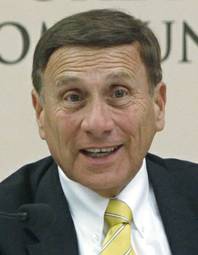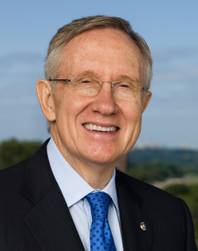Thursday, July 21, 2011 | 2 a.m.
Ely, Nevada

John Mica

Harry Reid
Sun archives
- House moves toward showdown with Senate on FAA (7-20-2011)
- Delta may drop flying in 24 small cities (7-15-2011)
- Senate bill would prop up rural air service in Nevada (2-1-2011)
Sun coverage
White Pine County Airport in Ely, the nation’s most rural airport to be serviced by commercial flights, survives to a great extent because of a federal program that subsidizes airlines that fly to far-flung areas.
But that survival is in jeopardy. The House has passed a version of the Federal Aviation Administration reauthorization bill that would cap the Transportation Department’s Essential Air Service subsidy at $1,000 per passenger. The only commercial airline that flies into Ely, Great Lakes Airlines, has been getting $3,720 per passenger.
House Transportation Committee Chairman John Mica, a Floridian, described the $1,000 as an “arbitrary” line, but one that makes sense, saves the country about $4 million a year and really only affects commercial service to three airports: Ely, Alamogordo/Holloman Air Force Base in New Mexico and Glendive in Montana.
“I couldn’t be more reasonable,” Mica said of the way he structured the bill. “If you ask anyone — anyone in Congress or any person on the street — do you think we should be subsidizing an airline ticket more than $1,000, they’d have to say no.”
The subsidy is intended to help support rural airports that serve few passengers but need to remain part of the grid.
“If there’s anything to the concept of essential air service, it’s embodied in Ely,” said Mike Coster, the airport’s manager.
Ely, population 4,255, is 240 miles from the nearest commercial transport hub.
“It’s the only way to get in and out of Ely other than through private transport,” said James Adams, who manages Ely’s Great Lakes Airlines station. “There is no bus service here. There is no train. There’s not even a taxicab in this town. If you want to get to Ely other than private driving, or out of Ely, you’ve got one option, and that is the airline.”
For years, Ely had been served from Denver — and getting just three to four passengers a day. But on May 15, Great Lakes — which has been Ely’s carrier for almost three years — began daily flights from Las Vegas instead. Passenger count has about doubled since June.
“About half of our passengers are business travelers; they come here for the mines, and as part of the power-line projects,” Coster said. “That’s why we’re getting such an increase, because the engineering companies that were flying to Las Vegas and then driving up here are now able to fly to Ely. And as these industries expand, we expect even more to.” (Other passengers include medical personnel tending to rural patients.)
The federal subsidy is important, boosters say, because it helps bring business and development to an isolated area — more than some of the federally supported rural airports in Alaska.
“I think an awful lot of people, particularly people back East, do not understand how far away things are,” Adams said. “There’s been more activity here related to mining, related to the new power line. There’s even a wind farm being built 30 miles to the east ... Will losing the airport have a significant economic downturn in the entire community? Very definitely.”
The president of Great Lakes Airlines did not immediately return a call to discuss how much of the Ely operating budget is covered by the $1.8 million subsidy, or what the airline intends to do about Ely service if it loses almost three-quarters of that financial aid.
But because the House bill that would cut the subsidy — which Rep. Joe Heck, R-Nev., voted for, and Rep. Shelley Berkley, D-Nev., voted against — is not based on the hope of potential, but on numbers quantifying performance, Ely’s operators are “afraid that (these gains) may be too late,” Coster said.
Senate Majority Leader Harry Reid is expected to push hard against the subsidy reduction.
“This is nothing less than an assault by Washington Republicans on already underserved rural communities ... towns like Ely have been hit particularly hard by the recession and are depending on their regional airports to get their economy back on track and create jobs,” said Reid spokesman Zac Petkanas, who characterized the proposed cuts to the airports as “reckless” and “irresponsible.”
The fate of the subsidy is wrapped up in the fate of the FAA reauthorization bill, separate versions of which have been passed by the House and Senate.
That overall fate is testy: The FAA loses its authority to operate Friday, and absent some arrangement to reconcile the bills, it is going to shut down temporarily, meaning thousands of employees will be furloughed.
That won’t affect essential air traffic personnel such as air traffic controllers. And it wouldn’t ground any commercial aircraft, as those are run by private businesses — although it would mean the airlines wouldn’t collect travel taxes while the FAA’s operations were suspended.

Join the Discussion:
Check this out for a full explanation of our conversion to the LiveFyre commenting system and instructions on how to sign up for an account.
Full comments policy